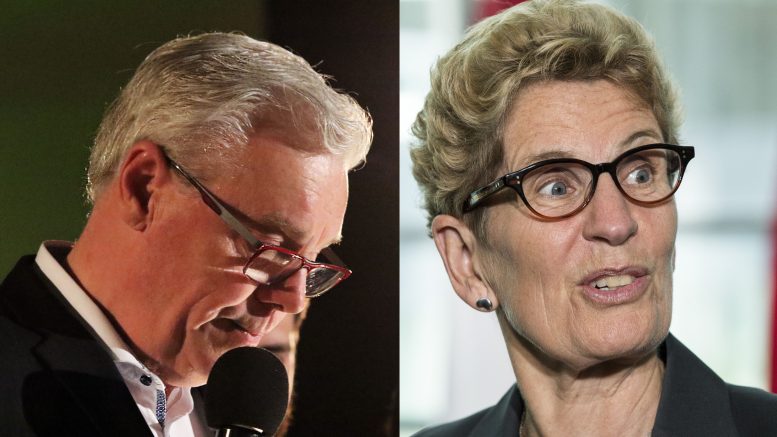An unpopular premier whose party has been in power for more than 14 years is under threat of losing an upcoming election to the PCs. No, this is not a reference to Greg Selinger and the Manitoba NDP of 2016.
This time it’s Ontario Liberal premier Kathleen Wynne who is in trouble.
Wynne and the Ontario Liberals – who have been in power since 2003 – are facing a provincial election in June and the odds, like Selinger’s in 2016, are not in their favour.
As a sort of pre-campaign campaign strategy, Wynne has been crisscrossing Ontario hosting town hall meetings since the end of 2017, taking open questions from anyone with a grievance.
Although Selinger never held any kind of Q&A sessions with Manitobans in the lead up to his party’s failed election, one can’t help but think such an event would mirror that of the Ottawa auditorium filled to capacity last week for Wynne’s first town hall in the nation’s capital.
Even before Wynne stepped onto the stage, frustrated Ontarians had trouble containing their anticipation to grill the premier on decisions her government has made over her five-year tenure.
How would Manitobans react if they had the chance to ask Selinger direct questions on controversies such as the provincial sales tax hike, his government’s decision to purchase expensive Tiger Dams, or the cabinet revolt that rocked his party to its core in 2015?
That town hall would have felt just as tense as Wynne’s. In Ottawa, the spectacle was a miniature version of Prime Minister Justin Trudeau’s town hall meetings, which have been grabbing headlines across the country since the beginning of the year. A platform situated in the centre of a packed auditorium with a large flag hanging behind the stage – all in all, perfect for a good photo-op.
Trouble is, Wynne fails to garner the same kind of celebrity admiration the prime minister does. In fact, her personal popularity is in shambles, with one late 2017 Forum Research poll giving her a 15 per cent approval rating.
Sound familiar?
Just two months before the Manitoba election, Selinger’s approval rating sat at 19 per cent.
Although Wynne never hiked provincial taxes or survived a cabinet mutiny, her government has gone through a few damaging controversies over her tenure as premier.
Most notably, Wynne’s Liberals privatized most of Hydro One, Ontario’s hydroelectricity provider, a move that immediately brought confusion and frustration to the residents of Canada’s largest province.
The political scandals originating from Wynne’s Liberal predecessor, Dalton McGuinty, have not helped the party’s popularity either. Just last week, McGuinty’s former chief of staff was found guilty in an Ontario court of deleting government documents in 2013 – just before Wynne took over – to shield the Liberals from fallout over revelations that plans for new power plants were cancelled in the lead up to an election at an estimated cost of more than $1 billion over 20 years.
And on top of Wynne and her party’s unpopularity due to political misgivings with similarities to Selinger’s NDP, there is the fact that the premier is an LGBTTQ* woman.
Since taking office, Wynne has had to contend with both sexism and homophobia. As The Agenda host Steve Paikin penned in April: “Is it possible that part of the reason [Wynne’s] poll numbers are down is that Ontario is a less progressive, more sexist, and more homophobic place than any of us would like to admit?”
All these issues were on full display as Wynne took questions from town hall audience members she selected at random. Between loud hecklers and a tense stand off with a man in the front row who delivered quite the angry, incoherent rant in the premier’s face – to which she stood her ground only four feet away – Wynne answered emotional questions on elder abuse in care homes, marijuana legalization, the Ontario college strike, racism, and more with professionalism and sympathy.
Despite the proverbial writing on the wall, it would be foolish to count Wynne and the Liberals out like most Manitobans correctly counted Selinger’s NDP out in 2016.
The Liberal government’s more recent progressive legislation – such as a minimum wage hike to $14 per hour, expanding health coverage for pharmaceuticals to all Ontarians 25 and under, and free college tuition for students from low-income families – have been popular moves. Those measures, paired with a strong provincial economy and an almost-balanced budget, all seem to have helped tighten the polling gap between Wynne and Patrick Brown’s contending PCs.
However, the road to victory is still a very long one for Wynne’s Liberals. The most recent polling still has the PCs leading anywhere from eight to 16 per cent over the Liberals.
Then again, the election is still a few months away, and that could be long enough to turn the tides of popular support.
As Ontarians exited the town hall into the chilly January night, it was hard to tell if many were left feeling more confident in their premier or if Wynne’s bid for re-election was indeed a lost cause.
Will the coming election prove to be a long-anticipated reckoning like April 2016 was for Selinger? Or will Wynne pull off a triumphant victory in the face of assumed failure?
Right now, it’s anyone’s guess.


